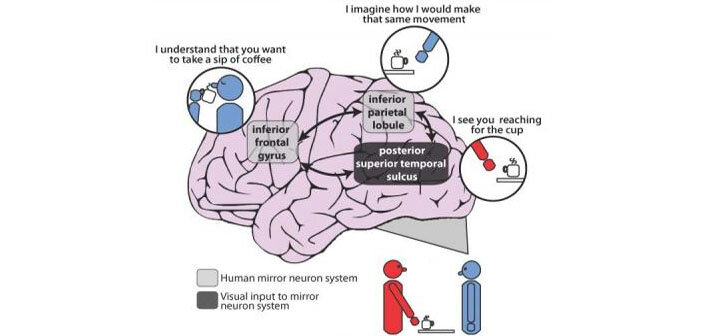Mirror Masters

Neuroscientists know which parts of your brain might let you read minds.
Dr. Eric Lis is a physician, gamer, and author of the Skirmisher Publishing LLC sourcebook, Insults & Injuries.
Neuroscientists know which parts of your brain might let you read minds.
Mind-reading is a subject near and dear to the hearts of geeks. It’s a central theme in fiction going back about as far as fiction goes, and telepaths and psychics have been the meat and drink of science fiction and fantasy in every form. Mind-reading is one of the most sought-after powers in RPGs, which is why so many classes in so many games develop one way or another of doing it, either via magic, psionics, mutant powers, or whatever other relevant ability is available.
Of course, this sort of mind-reading – the power to literally peer into, hear, detect, or otherwise know another sentient creature’s thoughts – is something which has never been reliably demonstrated to exist. When neuroscientists talk about mind-reading, they’re generally referring to something less superhuman, although if you think about, equally astounding: the capacity to look at another living thing, understand what it’s doing, interpret what it might be thinking, and empathize with its state of being. While obviously not as cool as actually being able to know someone’s deepest secrets by looking at them, this form of mind-reading is arguably one of our most astounding abilities and one of the most difficult to explain of all of the brain’s functions, and IF actual psychic and psionic phenomena exist (in our world or our games), this more basic form of mind-reading is almost certainly a pre-requisite for it.
There are a number of theories for how mind reading works, but one important explanation is the concept of “mirror neurons.” Mirror neurons are specialized brain cells connected to the visual system and the motor system, and they’re cool because they fire in the exact same way when a person performs a certain movement and when they see someone else perform the same movement. Think about that: somewhere in your brain, there’s a group of cells which reacts exactly the same way whether you’re making a fist or the person next to you is. Due to the difficulties (read: current impossibilities) of studying a single neuron in a living human, we don’t know exactly what role mirror neurons play, but the best guess is that they’re involved in how babies learn to mimic movements and pick up language, and in how adults interpret others’ actions as well as our ability to feel empathy. There’s a fair bit of controversy over these unproven guesses, and it’s an important area of research. For better or worse, to my knowledge, no one has yet done any studies trying to ascertain the role of mirror neurons in psychic phenomena and paranormal experiences.
The existence of mirror neurons raises some interesting questions are far as gaming goes. Ignoring the practical considerations of what role they may play in spotting when someone is bluffing at the poker table or how mirror neurons influence our thinking when we watch someone else roll dice, they have implications in-game. In most game systems, psions of various types are born with their abilities; do they have some in-born difference in their mirror neurons which expands their functionality, or is there some related neural circuit that allows more literal mind-reading? Arcane magic is heavily dependent on hand gestures and speech; do mirror neurons play a role in learning new magic, and what role do they play in counter-spelling and magical duelling? Mirror neurons may be the part of the brain that sees minute shifts in position and muscle movement and interprets what direction a sword-stroke is about to come from; could a fighter or monk learn to develop this part of the brain to develop seemingly super-human reflexes in combat? Maybe spells like true strike work by momentarily enhancing mirror neuron function so that the enemy’s defenses can be perfectly anticipated.
Or, how species-specific are mirror neurons? Mirror neurons probably aren’t sophisticated enough to know if a hand or arm movement is being performed by a human or an elf, but how about the movements of an otyugh’s tentacle? If mirror neurons do somehow distinguish between dwarves and halflings, could this be one reason why it’s easier for creatures to empathize with their own race than another? Or, for that matter, could it be why part of why dwarves and gnomes, who are more physically similar, get along better than dwarves and elves? There’s unquestionably room for a creative storyteller to have some fun with this concept and play with players’ expectations a bit.